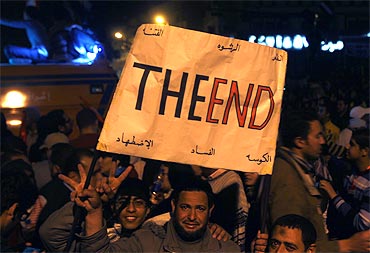This article was first published 14 years ago
Home »
News » Egypt: What next after the revolution?
Egypt: What next after the revolution?
Last updated on: February 15, 2011 14:26 IST
Image: The Egyptian flag is aflutter as fireworks explode in celebration after Hosni Mubarak stepped down as Egypt president
Photographs: Mohamed Azakir/Reuters
Ajit Sahi reports from Cairo on how Egypt is picking up the pieces post the revolution
We sit on chairs placed on the sidewalk by a coffee-and-hookah joint outside the great pyramids of Giza, a 45-minute ride to the south of Cairo city. This is the third day that Egypt has had no president in nearly 60 years. Demolished by the world's biggest popular uprising in recent history, Hosni Mubarak had resigned as president three nights ago, on February 11.
Eman Massoud, the five-feet-nothing feisty 30-year-old tour guide who looks no older than 20, is chatty, overflowing with excitement. The other five with us are men, all tour guides.
Eman has a big coffee mug in her hand. "These men are like my brothers but we could never speak freely among ourselves as we do now," she said. And they all agreed.
A new dawn has broken in Egypt, and the 85 million people of this ancient land -- "7000 years of history," said Eman -- "are not going to allow the dark night to return again."
For all the scepticism about the military, which rules now and which has suspended the dictator's constitution, dissolved his fake parliament, and promised free elections in six months, these people have no doubts that the transfer to civilian power is imminent. "We trust the military and we know that they know that they must make way for a civilian government," said Ahmed, one of Eman's fellow guides.
...
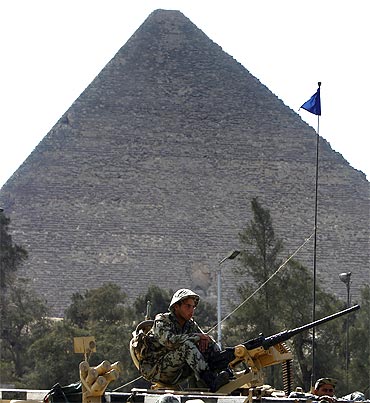
Image: Tours to the pyramids and the Sphinx were restarted on Sunday after a 20-day shutdown
Photographs: Yannis Behrakis/Reuters
Today, Eman, Ahmed and hundreds of other tour guides are ecstatic, as tours to the pyramids and the Sphinx have restarted since Sunday after an agonising shutdown that lasted 20 days.
It was exhilarating to be among them, as they waved flags, raised slogans boisterously, sang their national anthem, and carried placards that beckoned tourists in different languages of the world -- with the pyramids towering behind them. These tour guides speak different languages to specialise for tourists from different parts of the world.
"Egypt is safe. Egypt is free. Please come back to Egypt," so many of them said to me. On a given day, about 10,000 visitors come to the pyramids. For three weeks since the January 25 uprising in Egypt, there had been no tourists.
This has proved disastrous for the tour guides, the memorabilia sellers, the horse and camel men, because they all live on daily wages.
A tour guide in Cairo typically gets paid 50 Egyptian pounds, or about Rs 400 a day, even though a tourist may have typically paid up to $ 200 (less than Rs 10,000) for the Giza experience. No surprises that the rest of the money goes to the companies that hire the guides.
What they earn is quite clearly a pittance, especially if you consider how educated they are. Eman is a walking encyclopedia, and is passionate about Egyptian history as she writes my name in hieroglyphs, a formal writing system used by the ancient Egyptians.
But even she defers to Mamdouh Goda, another guide, who explains to me patiently the various theories about the origin of the name of Egypt, including the mentions in the First Testament.
What do they expect in the new Egypt? "That I won't have to pay bribes to be a tour guide," said one bluntly. Others hope that their industry will be better organised, and gain some welfare support.
For example, several tour guides died in terror bombings at the coastal resort town of Sharm al Shaikh in July 2005, in which more than 60 people were killed. "The families of these tour guides got nothing from the government," one man told me.
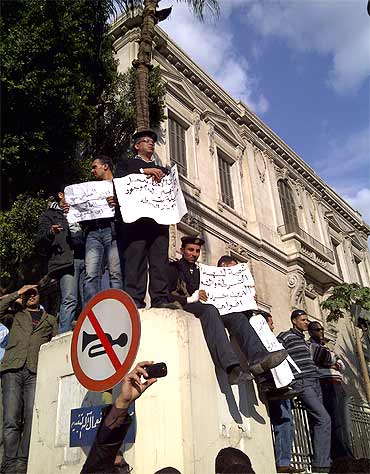
Image: Following the revolution, protests in some parts of Cairo continue
Photographs: UNI TV
An hour later, Mamdouh drives Eman, cameraman Raju and me back into Cairo city. On the way we run into a roadside protest by members of the Muslim Brotherhood. These men hold placards that say 'We Want Egypt to be an Islamic country'. Eman is stunned. "This is scary," she says. "We don't want this." Mamdouh is sceptical it will every amount to anything.
Earlier in the morning, before we sped away to Giza, Raju and I went to meet Essam El Erian, the 57-year-old official spokesman for the Muslim Brotherhood, the controversial Islamic organisation that was formed in 1928 and that reportedly practised a politics of violence for decades.
But over the last 30 years, the Brotherhood claims to have eschewed violence, both in words and deed. "We are peaceful. Not like the Al Qaeda or Taliban, who are wrong in their ways," El Erian told me in a long video interview. He, too, says that the military must be trusted to transfer power to the civilians, and doesn't doubt the announcements by the armed forces.
El Erian is an interesting character. He has been jailed more than half a dozen times, the longest for five years until the year 2000. He joined the Brotherhood while very young, in his early 20s, and was almost immediately arrested. Although designated a spokesman, he is the most visible face of the Brotherhood.
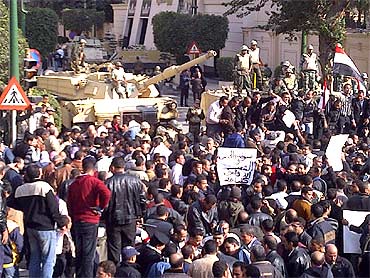
Image: The protests in Cairo
Photographs: UNI TV
While the Western commentary is fearful of the Brotherhood, most people in Cairo I met over the last 10 days have said the following: "The Brotherhood has perhaps only 10 to 15 per cent support among the people. Let there be democratic elections. Let them win as seats many as they can. Like everyone else, they should be part of the democratic dispensation. We will be fine with that. No, no one can make Egypt a non-secular country, a land of bigots and backward fundamentalists."
For El Erian, the priority is to get Egypt working again. He backed the army's swift action to remove the 1,000-odd protestors who wanted to continue camping at Tahrir on February 13. "We have get back to normal," he said.
Image: Protesters celebrate the end of Mubarak's regime in Tahrir Square
Photographs: Yannis Behrakis/Reuters
But Egypt is back to normal already. Actually, that's not true. Egypt is normal for the first time in living memory.
Until now, for decades, Egypt was either in colonial control or under a monarch or, for the last 40-plus years, under dictatorship, often given the fig leaf of a rigged election. Especially since its utterly humiliating military defeat at the hands of Israel in 1967, its government increasingly became a Western appendage and stooge.
For a brief while, Mubarak's predecessor, Anwar Sadat, made Egyptians thrilled by leading a war against Israel in 1973, in which Egypt saw earlier gains. But subsequently Sadat bought peace with Israel with a treaty which angered many, and ultimately resulted in his assassination in October 1981, which brought Mubarak to power.
Decades of humiliation at the hands of external powers, from the United States to Israel, emaciated whole generations of Egyptians, who began to cower under a terrible security State at home.
But now, it's people rule Egypt, even if they are yet to elect a representative government. The military that has taken the onerous task of heralding democracy in Egypt in the near future knows acutely that it cannot falter from that path, or the people's will will haunt it, too.
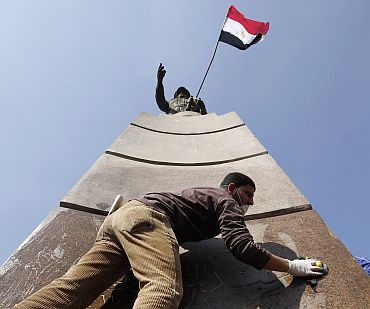
Image: The statue of Egyptian Army General Abdul Moneim Riyad at Tahrir Square
Photographs: Mohamed Abd El-Ghan/Reuters
For 20 days, Tahrir Square has hosted between tens of thousands and over two million people on various days. You have seen on television hundreds of tents, sprawling stages, banners, everything that made it the greatest revolution this century. Well, today, it is spic and span.
It is inconceivable how easily the revolutionaries have cleared out Tahrir Square, cleaned it up fully, down to the last filthy blanket.
Self-appointed volunteer groups -- sometimes just individuals -- have been going around like possessed maniacs, painting the sidewalks, railings on the bridge of Qasr al Neel, over the river Nile, collecting garbage and litter. The festoons have all been taken off by the protesters themselves, the stages are gone, so are the huge music speakers that towered at 12 feet on top of each other.
A bunch of young men stand around an entire sidewalk, stopping people from stepping on the new paint. "I love my country," one of them says to me. Surprise me, I think, for that's the answer I hear from nearly everyone since I landed here 10 days ago. A fashionably dressed woman, wearing a hijab, the Islamic head cover for women, her flashy lady's bag slung across her shoulder, cleans the street with a broom, driven by herself. She flashes a smile at me, and carries on.
Of course, now that the revolution is victorious, Tahrir Square has taken the look of a memorial. Cars have now been allowed to pass through it, but there still are many people strolling around on the roads. The markets around are brightly lit, abuzz with activity.
Right now, the music has started again outside my hotel window. And Raju and I need to go out and join the unending celebrations.




